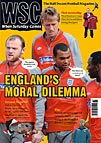 In a golden age for domestic Dutch football, Feyenoord and Ajax often found the going tougher at home than they did in European competition. Ernst Bouwes looks back on the 1970-71 Eredivisie season
In a golden age for domestic Dutch football, Feyenoord and Ajax often found the going tougher at home than they did in European competition. Ernst Bouwes looks back on the 1970-71 Eredivisie season
The long-term significance
This season the Dutch league was arguably the best in Europe if not the world, being host to the 1970 European Cup winners Feyenoord and the team who were about to succeed them, Ajax. PSV reached the semi-final of the Cup-Winners Cup and FC Twente the quarter-final of the Fairs Cup. Between 1969 and 1978 these four teams would play in eight European finals and win six.
Story of the season
Despite their prowess in Europe, Ajax and Feyenoord weren’t able to dominate the League at his point. At the start of the spring they became joint leaders for the first time with sixth-placed ADO, the early pace setters, only two points behind. The big two then both won eight games in succession to make their encounter at the end of May in Amsterdam a title decider.
It was the first League game broadcast live on national TV, played on a Thursday night to give Ajax more time to prepare for their European Cup final against Panathinaikos the following week. In a rain soaked Olympic Stadium winger Piet Keizer gave Ajax the lead, but then Feyenoord used their physical strength to gain momentum. Brutality, after all, was as much a factor in Total Football as movement and skill. Wary of injuries, the Ajax forwards kept their distance from the formidable centre-back pairing of Rinus Israel and Theo Laseroms.
Meanwhile, Feyenoord’s midfield playmaker Wim van Hanegem neutralised Ajax’s most forceful player Johan Neeskens with an elbow. Two goals from full-back Theo van Duivenbode, signed from Ajax the previous year, brought the title back to Rotterdam. Feyenoord had been knocked out in the opening round of the European Cup by Romanian side UT Arad, but that made them concentrate on the League while Ajax had had to play two games a week since April.
For a bet Ajax keeper Heinz Stuy played the last League game, away to Go Ahead, as a striker – they lost 4-1. They did win a domestic trophy, beating Sparta in a replayed Cup final. Haarlem and AZ‘67 were the whipping boys that year. AZ‘67 were furious when the Dutch FA decided to give the vacant spot from a merger between the Den Haag clubs ADO and Holland Sport to Vitesse, who were third in the second division. Vitesse’s only notable contribution in 1971-72 was a League record defeat of 12-1 against Ajax.
Ajax coach Rinus Michels left for Barcelona in the summer but the club were European champions for a further two seasons under his successor Stefan Kovacs. This exciting season only drew capacity crowds at the home of the champions to be. If Feyenoord’s 46,593 is deducted the League’s average crowd was just 11,500. Nobody then knew it would not get any better.
For the record books
Feyenoord remained unbeaten at home for the third consecutive season. After defeat to the Rotterdam side Ajax won 35 home games in a row, scoring 145 goals.
Same place today
Only Ajax, Feyenoord, PSV and FC Utrecht have managed to stay at the top level. Ten of these clubs are in the Eredivisie today.
Moved furthest away
DWS became the victim of their local rivals Ajax’s success. Their subsequent merger with two other clubs as FC Amsterdam failed after a few years, leaving Ajax the capital’s only professional club representative since 1982. DWS now play four divisions down in the amateur leagues. Haarlem, in the second level Eredivisie, went out of business at the end of January 2010.
From WSC 277 March 2010